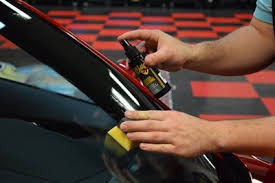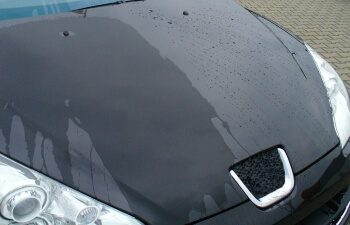Glass Coating - What is it?
Glass coatings consist of particles of silicon dioxide (SiO2) that work to repel contamination and increase shine. The SiO2 means the coating contains “pure glass” with the glass in a molecular form, held in a liquid. The coating does not become “glass” until it is allowed to dry.

Whilst a glass coating is about 500 times thinner than a human hair, it leaves a wet look that is popular in the car industry, even though the coating is invisible to the naked eye.
Glass coating has been around for a while and is still popular in the car market. It is marketed under several names including liquid glass, nano-glass, ceramic glass, and quartz coating.
The two major types of glass coating are quartz silane and silica. Quartz silane is more expensive because the manufacturing process is more difficult, but it provides a very durable and extra shiny coating. In contrast, silica is less durable, making it cheaper than a quartz silane coating. A glass coating will form a hard, durable and semi-permanent shield over paint, glass and wheels, with different coatings available for each surface.
What it does
Glass coating once applied is an invisible, durable coating that repels water, is antistatic, and protects the surface from dirt, dust and other pollutants sticking to it. This makes cleaning much easier. Glass coating also increases resistance to scratches by up to 10 times the resistance of non-coated materials.

Glass coating can be used on a number of different surfaces, not just vehicles, including tiles, glass, bowls, grout, floors and pools and is safe to use on glass, ceramics, stainless steel, acrylics, painted surfaces and wheels.
With vehicles, a glass coating improves visibility during rain on windshield glass. Glass coating is available in brands that are either colourless or a pale yellow. There is only a mild smell with this water-based coating.
Glass coating is much simpler to apply than ceramic coating since it does not have to be applied at a specific heat like a ceramic coating. Also, glass coating has a less rigid application process meaning there is more time available to polish and buff the coating to get the result you want. This means there is less risk of making an error, but also means a correction is not so costly. A coat can last anything from six months to one year under normal conditions, when it can simply be reapplied. If you're still now convinced that glass coating is good for your car, read this page, where I talk about the benefits.
Types of glass coating
There are several types of glass coatings, which by their very nature do not include the need for heat, including:
- High-gloss water-repellent glass coating
A two-component glass coating that produces instant luminosity. A special chemical reaction creates a long-lasting water-repellent effect and prevents adhesion of raindrops and water spots.
- Hybrid Titanium / Glass Coating
Titanium enriched glass coating generates a hard membrane with water repellent properties that protects the paint surface from dirt, acid, UV rays and scratches.
- Pure Glass Coating
A pure glass coating is high in silica making it an extremely durable and hard glass coating that reflects light with specific wavelengths, producing an instant luminous shine and gloss. It also works as an excellent water repellent with additional scratch protection.
- Nano-titanium glass coating
For a very deep shine and spectacular reflection on the paint a nano-titanium glass coating also provides a harder protective layer against wear and the ageing of the vehicles clearcoat.
- Advanced water-repellent glass coating
Based on a three-dimensional molecular framework it forms a highly durable clear glass coat with strong water repelling effects on the paint and produces a unique “candy-like” gloss.
- Heat resistant hard glass coating for wheels and body
A hard glass coating with a tight molecular structure that creates long-lasting protection resistant against heat of up to 1,300°C. Therefore, it is particularly efficient in protecting wheels from burning-hot brake dust.
Call in the professionals
There are many options available on the paint protection market and sometimes it may be challenging for customers to choose what is best for them from the range from traditional waxes through polymer sealants to ceramic coatings. Consultation with a reputable professional is always recommended to choose a protection product that fits your individual needs.
After consulting with a profesional and you know what meterials to use, make sure to read my guide on how to correctly apply the glass coating.